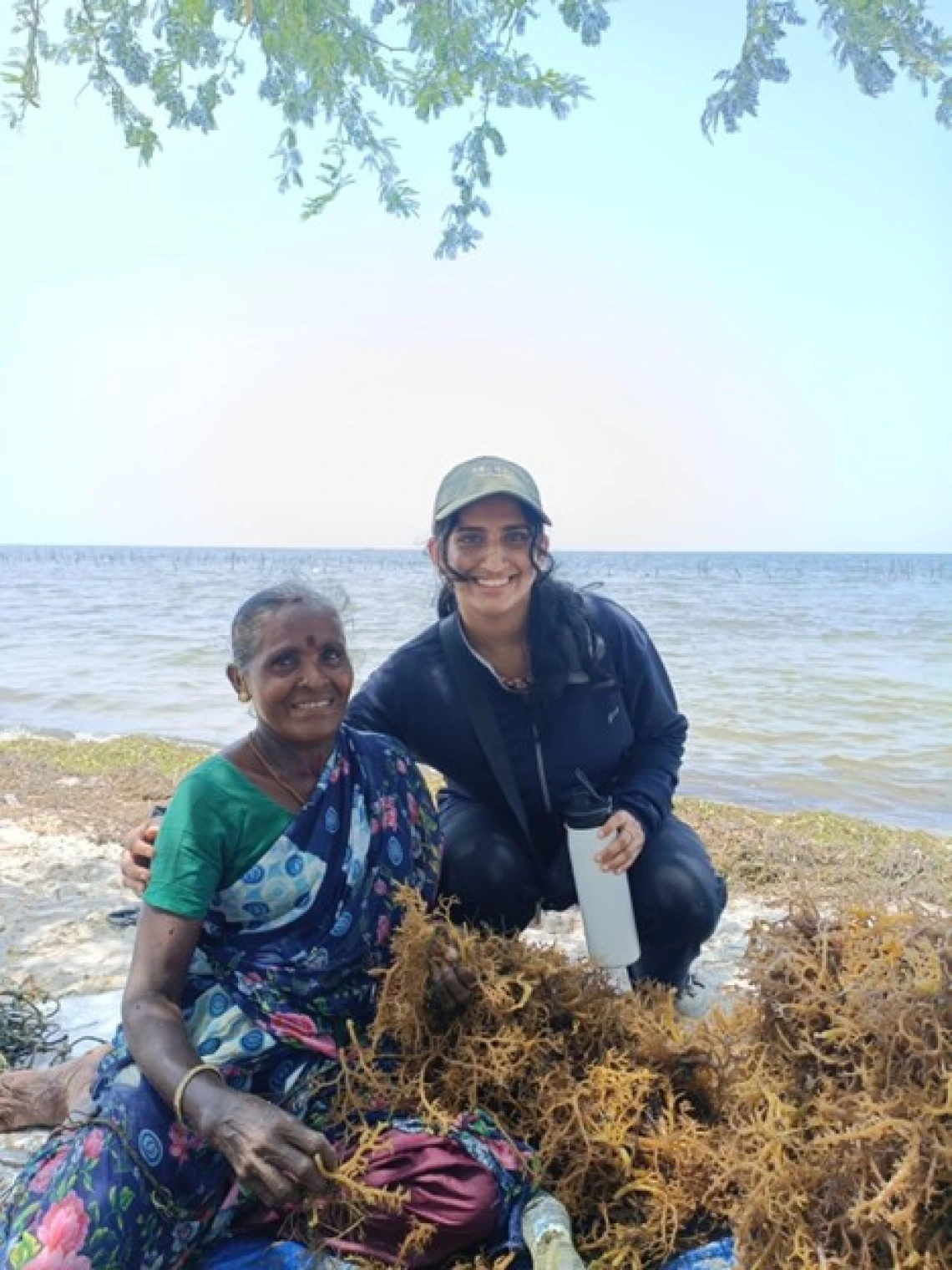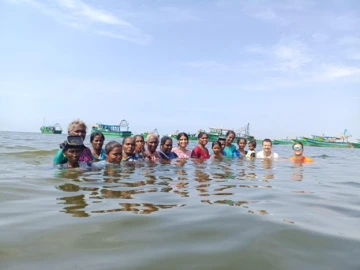Building Coastal Resilience and Women's Empowerment: My Internship at Amrita University

University of Arizona intern Anusha Sharma visiting monoline seaweed structures along the ocean and connecting with a local woman as she dries seaweed.
This blogpost by Anusha Sharma reflects upon her recent internship at Amrita University; you can read more about other Human Rights Practice students who recently completed this internship funded by the RISE Program of the Arizona Institute of Resilience.
by Anusha Sharma
In summer 2025, I got an opportunity to work with Amrita Vishwa Vidyapeetham, one of India's foremost research universities known for its emphasis on sustainability and humanitarian outreach. Through its Live-in-Labs® experiential learning program, I participated in the Seaweed Livelihood & Coastal Resilience Initiative, a project aimed at promoting sustainable marine-based livelihoods and empowering women in Tamil Nadu's coastal village of Solakuddi.
The project, which was sponsored by AMMACHI Labs and the Center for Women's Empowerment and Gender Equality, aimed to eliminate gender disparities in the marine industry, where women frequently face barriers to resources, training, and earning possibilities. Our team organized activities focused on sustainable seaweed production, seagrass restoration, and marine ecology, as well as swimming classes and participatory group games to boost confidence and resilience.

Women from the community and interns celebrate after a joyful ocean swimming class an empowering moment of confidence, connection, and shared accomplishment.
Living and Learning in Kerala
The internship took place in Amritapuri, Kerala, a beautiful coastal campus that felt like a place of equal parts learning and reflection. Amritapuri is also home to Amma's Ashram, where visitors from all over the world seek clarity, tranquility, and spiritual growth. This resulted in a unique environment in which academic research and personal development co-existed smoothly.
The variety of persons I encountered added to the uniqueness of this trip. I got the opportunity to engage with students and academics from Spain, France, the Netherlands, and other parts of the world, each offering their own unique ideas, cultures, and experiences. Conversations covered languages and ideas, making this internship more than just about assisting communities, it was also about growing my own viewpoint in a genuinely global setting.
Community Engagement and Activities
In Solakuddi, we immersed ourselves in the rhythm of seaside life. We began by visiting seaweed farming areas and seeing fish-drying, which is an important seasonal livelihood for women. Interactive events such as "Ocean Bazaar: How Much is Too Much?" drove discussions about sustainable resource use, while ocean mapping enabled women to contribute their extensive ecological knowledge of local marine systems. We also took part in seagrass restoration, which combined hands-on environmental activity with long-term coastal health.
One of the most memorable experiences for me was teaching swimming lessons to women who had previously felt uncomfortable in the water. Seeing their confidence grow, one woman swimming into deeper water for the first time was extremely fulfilling and symbolic of empowerment beyond physical abilities.
Cultural Connection and Reflection
The warmth and hospitality of the women made an unforgettable impression. They welcomed us into their houses, braided jasmine flowers into my hair, and told us intimate stories about their daily lives and dreams. While certain planned activities, such as a self-reflection exercise, did not go as planned, we quickly modified, realizing how essential cultural context is in facilitation.
Hearing women articulate their common goals of educating their children and having secure homes demonstrated how empowerment begins with making room for voices to be heard. These experiences showed me that development work is more about listening than it is about teaching.
Takeaways and Impact
This internship was transformative, bringing together sustainability, gender equity, and intercultural understanding. Working with women in the villages and students from around the world increased my understanding of how global collaboration can lead to local transformation. I left with practical information on marine livelihoods and environmental sustainability, but most significantly, I gained friendships, perspective, and lessons in resilience and humility.
As we said our goodbyes on the last day, surrounded by values and gratitude, I felt overwhelmed with gratitude for this experience. It increased my determination to work at the intersection of human rights, sustainability, and women's empowerment, and it reminded me of how deeply people are interconnected, no matter where they come from.
A special thank you to the RISE Resilience Internships and Student Experiences program at the Arizona Institute for Resilience for sponsoring this trip and turning what many only dream about into reality. I am also grateful to the Human Rights Practice Program for its support and guidance, which made this impactful experience possible.
Anusha Sharma is a senior at the University of Arizona majoring in Global Studies and pursuing an Undergraduate Certificate in Human Rights Practice.
Related stories:
RISE Internship Lessons in India: Building Life and Career Skills Experientially by Aaron Womack
Threads of Resilience: Lessons from Women Entrepreneurs in India by Beatriz Winters

